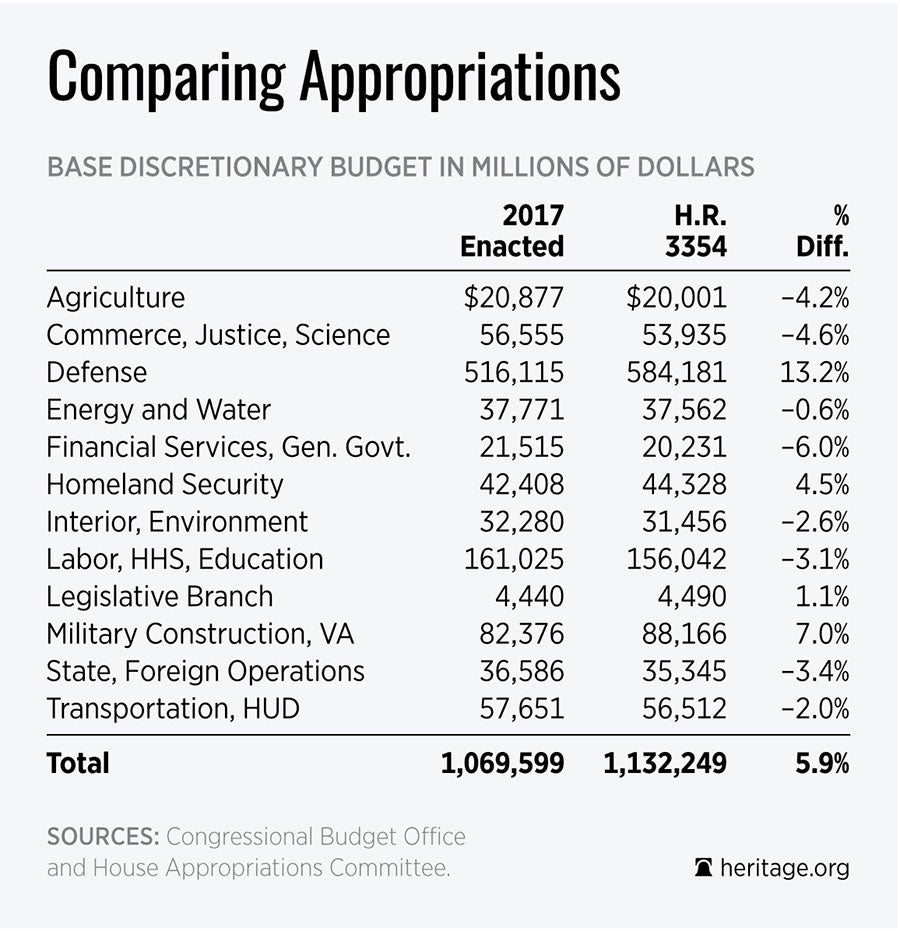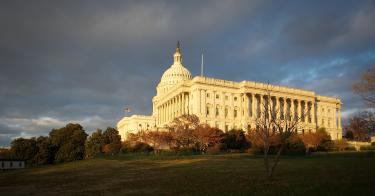This week, the House of Representatives is expected to vote on the eight remaining annual appropriations bills.
The House will combine the four-bill Make America Secure Appropriations Act (H.R. 3354), which was passed prior to August recess, with another “mini-bus” package. In total, the package would spend $1.132 trillion in fiscal year 2018, busting the Budget Control Act cap by $67 billion.
Passing all 12 bills through the House is a positive step toward returning to the regular order appropriations process. However, Congress should reject more spending and instead prioritize funds within the existing budget caps—or better yet, cut wasteful programs and reduce the federal deficit.
This package would increase spending by more than $60 billion compared to 2017.

In July, the House passed a four-bill mini-bus spending package on defense. The package made progress in some areas, mainly by increasing the lagging national defense budget by $72 billion in 2018.
It failed, however, to make much-needed reforms within the Departments of Energy and Veterans Affairs. Without amendment, it would also trigger the Budget Control Act’s automatic enforcement provisions for defense spending.
National defense should be a top priority for Congress in the upcoming spending debate. Increases in defense spending, though, should be offset by reforms to domestic programs.
The House has failed to meet this challenge. The package being voted on this week would cut nondefense spending by just $5 billion while increasing overall discretionary spending by $67 billion compared to the 2018 Budget Control Act Cap.
On top of that, the eight-bill package calls for $21 billion in spending not subject to the budget caps. These come in the form of upward adjustments for overseas contingency operations funding to the State Department, disaster relief, and program integrity initiatives.
This is on top of the more than $74 billion in adjustment passed in July’s mini-bus.
>>> Read The Heritage Foundation’s September Action Guide for Congress in 2017
Too often, Congress uses overseas contingency operations funding to prop up base funding requirements for the Departments of Defense and State. Congress should ensure that overseas contingency operations funding is being used for true emergencies as intended, rather than propping up agencies’ base budgets.
The same can be said of disaster spending. The $6.8 billion provided by this bill is almost identical to the amount provided in 2017.
Disaster and emergency funding should be reserved for truly urgent, unforeseen events, such as Hurricane Harvey. Funding for recurring and somewhat predictable events like wildfires, seasonal flooding, etc., should be budgeted for within the Budget Control Act caps.
Doing so would allow FEMA to build up greater reserves and be better prepared when true catastrophes strike.
The House package also includes another $1 billion in funding not subject to the budget caps. This money was provided in last year’s 21st Century Cures Act, which established several new discretionary accounts funded by transfers from the Treasury and specifically excluded from the Budget Control Act limits.
This represents yet another example of Congress using new gimmicks to avoid the caps and spend more money.
Instead of increasing spending, Congress should follow the lead of others and increase defense spending while making much-needed reforms to domestic programs.
The Heritage Foundation’s Blueprint for Balance recommended $87 billion in cuts that could be made in 2018 while providing over $80 billion in additional funds for national defense. President Donald Trump’s budget called for $54 billion in increases to defense in 2018, all offset by cuts to domestic programs.
The House Republican Study Committee put forth a budget that prioritized national defense while making more than $100 billion in reforms to other discretionary programs.
Some in Congress may argue that a $67 billion increase in funding is miniscule in the context of a federal budget that is projected to reach nearly $4.1 trillion in 2018.
But the amount of cuts is not the point. Reducing the size and scope of government is a worthy goal regardless of how small or large the overall impact on the federal budget.
Returning power to the private sector as well as state and local authorities allows the federal government to focus on its true constitutional objectives and frees up valuable resources to pursue those goals.
Combined with a pro-growth tax and regulatory agenda, these reforms would help to release strong economic growth.
Congress must reject more spending and seize the opportunity for budget reforms this year. The country cannot afford to delay any longer. With Republicans controlling Congress and the White House, there is no better opportunity for reforms than now.
This piece originally appeared in The Daily Signal



